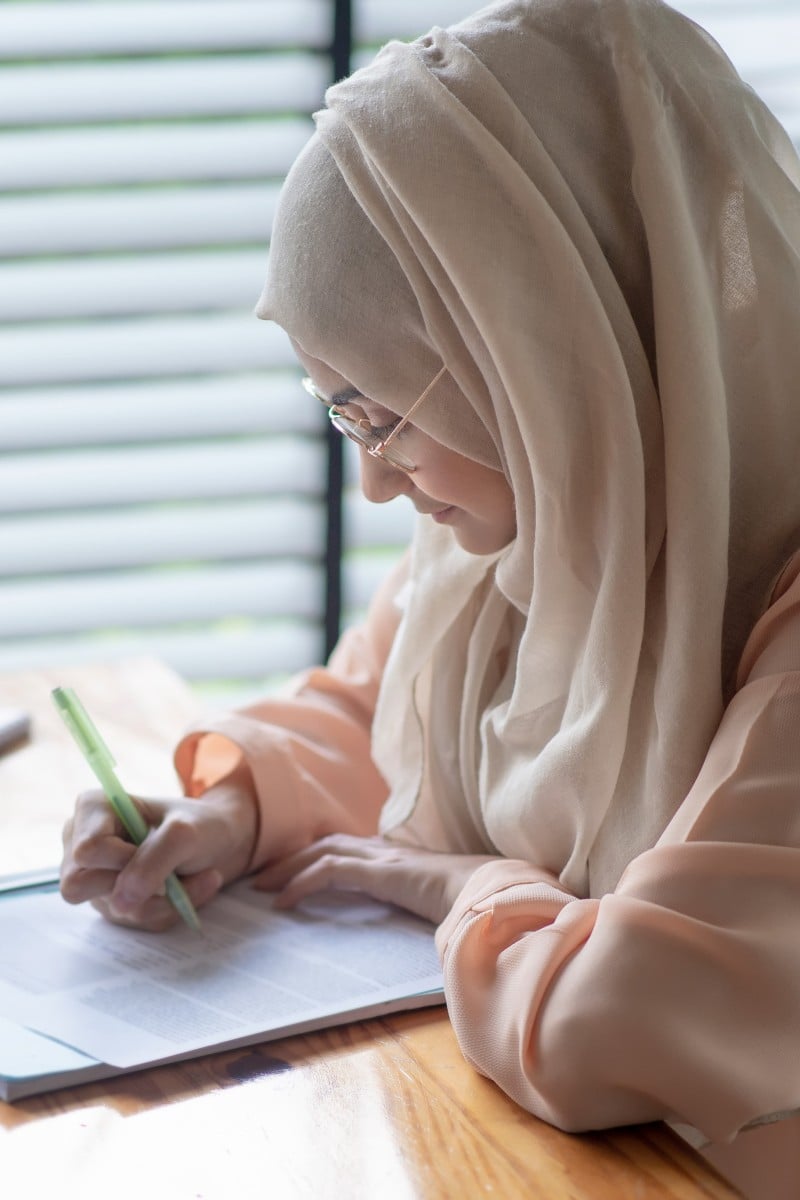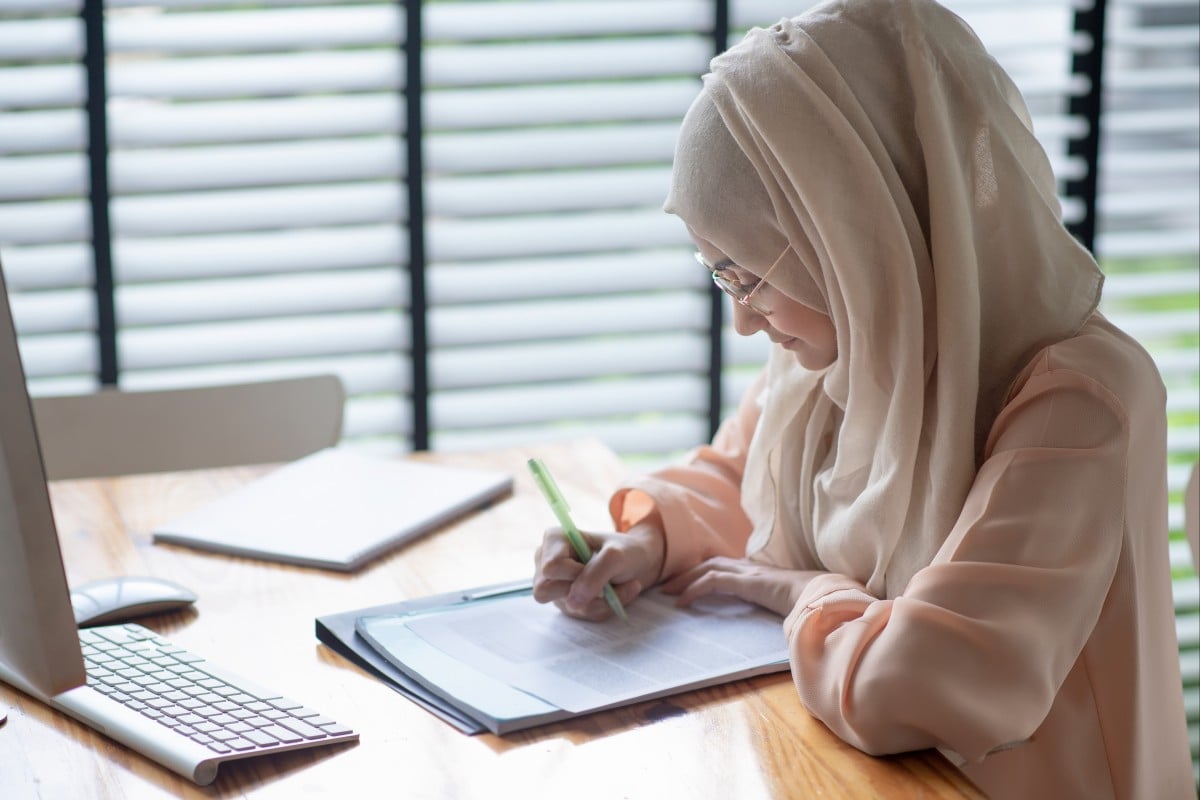
- The holy month can be tricky to navigate in settings where others may not understand Islam, but teens suggest being open to sharing about religion and culture
- Muslim dietitians recommend nutritious meals with a focus on protein, fibre, complex carbs and healthy fats to give kids more sustained energy
 Fasting while also going to school can be tough, but it doesn’t have to be if students have support from peers and teachers. Photo: Shutterstock
Fasting while also going to school can be tough, but it doesn’t have to be if students have support from peers and teachers. Photo: ShutterstockMuslim children typically are not expected to fast during Ramadan until they reach puberty. But often kids will want to start earlier because they see everyone else in their families abstaining from food and water from sunrise to sunset – followed by their community gathering to break fast together – and they want to participate.
“I really wanted to get in on the fun,” said Raahim Sattar, who started fasting when he was about seven.
He is from the US state of California, and now, at the age of 18, he is learning Arabic at the Qalam seminary in the city of Dallas. He has older twin brothers – and a competitive streak: “I was like, hey, maybe I can do it better than them.”
An explainer on what Ramadan is
Sattar, who plans to study law after he finishes his studies at the seminary, encourages young people, especially kids who are not yet required to fast, to not be too hard on themselves.
He recalls a time when he was supposed to be fasting and absent-mindedly popped some of his friend’s Goldfish crackers into his mouth, panicked and found the nearest trash can to spit it out.
“An accidental snack is a gift from God,” he said. “Just enjoy it, think of it as a booster and finish your fast strong.”
Observing Ramadan at school
In Muslim countries – or Islamic schools elsewhere – entire schedules shift to accommodate Ramadan. But the holy month can be trickier to navigate in settings where peers and others may not understand Islam.
Ramadan was a big deal in Salma Rashad’s house when she was a kid. She grew up in California and attended an Islamic private school. But when she started going to public school, she found that not a lot of kids knew about it. So she would invite her non-Muslim friends over to see the decorations – the lanterns and lights – and to break fast with her family.
Now a 19-year-old university student, Rashad started a Muslim youth mentorship programme during the pandemic, and she said many of her mentees were nervous about fasting at school. She advises young people to find other Muslims at their school, if possible.
“That makes it a lot easier to fast when you have others there with you, to lift each other up,” she said.
But your supportive community is not limited to those who share your faith.
“A lot of youth, they tend to hear the horror stories, and all the negative things that [happen to] our community,” she said. “But in reality, a lot of us at that age are very welcoming and accepting.”
How Muslims in Tunisia celebrate Eid during Covid-19
Rashad encourages her mentees to be open to answering questions.
“I honestly think answering those questions from the start clears up so many misconceptions, and it makes it easier in the long run,” she said.
“Don’t be embarrassed,” she added. “Part of your identity is your religion. It’s something that you can own.”
Abeer Shinnawi, a secondary school teacher, agreed and added that a trusted teacher could help too.
“If you’re too shy or don’t feel comfortable speaking, maybe have that teacher who can help you promote – if that’s what you want to do – or teach your peers,” Shinnawi said.
Tips on fasting in a healthy way
“It’s honestly up to the kids and up to the family what they want to do,” said Aisha Aslam, the acting principal of Orange Crescent School, a private school founded by the Islamic Society of Orange County in California.
Kids can start by fasting for a few hours, by skipping lunch or by fasting only on the weekends.
“Ramadan is meant to be a time of reflection, discipline and gratitude for our blessings,” Aslam said. “And acknowledging that we are fortunate that we can break our fast with a beautiful meal with family and friends. Not everyone has that opportunity or privilege.”
Muslim dietitians generally agree that you want to be careful with kids who are fasting.
“The last thing we want is for them to be losing weight when they should be growing,” said Sumiya Khan, a registered dietitian.
Balanced and nutritious meals – with a focus on protein, fibre, complex carbs and healthy fats – will give them more sustained energy and avoid sugar crashes.
Khan recommends supplementing their Ramadan diet with multivitamins, “just to give a little bit of insurance”. Hydration during the times they can have water is crucial.
KFC’s interest in offering halal food brings hope to Hong Kong’s Muslim community
Jivanjee-Shakir, who works with patients with eating disorders, also advises monitoring how young people are talking about their bodies and making sure that the practice of fasting is contained within the holy month.
Make sure kids understand that there are valid exemptions from fasting, including illness. Eating disorders are illnesses, according to Jivanjee-Shakir.
“Islamic doctrine really encourages the protection of the body,” she said. “So if you’re protecting your body by not fasting because it harms your mental or physical health, then you are in fact honouring Islam, and you are honouring the religion. It doesn’t make you a bad Muslim if you’re not able to fast.”
How parents and teachers can help
It’s not just the fasting that makes Ramadan a challenge. Students are also up before sunrise to eat. There are taraweeh prayers throughout the night – which are not required, but are an integral part of observing Ramadan in some families.
Rashad and Sattar said they adjusted when they studied because it was hard to concentrate once they got more dehydrated in the afternoons.
Zakia Pathan, a special education teacher, encourages teachers and parents to find ways to cut back on activities for their Muslim students during Ramadan.
“It’s supposed to be a time where you’re simplifying your life,” she said. “Being calm, spending time with myself and reflecting on who I am – that’s a big component [of] Ramadan.”
September 11 opened the floodgates to Islamophobia, even in Hong Kong
Here are some tips that can help students who are fasting:
-
Options for physical education and sports: Some students will have the stamina to take part while fasting, but others will need to take a break or do lighter versions of the activities. Watch for dehydration and exhaustion.
-
Options for other places to go during lunch break: Some kids might want to sit with their friends. Others may want to rest, nap, pray in private or work on homework in the library, a career centre or a classroom.
-
Flexibility with homework and exams: A lighter homework load or the ability to make up tests could be helpful.